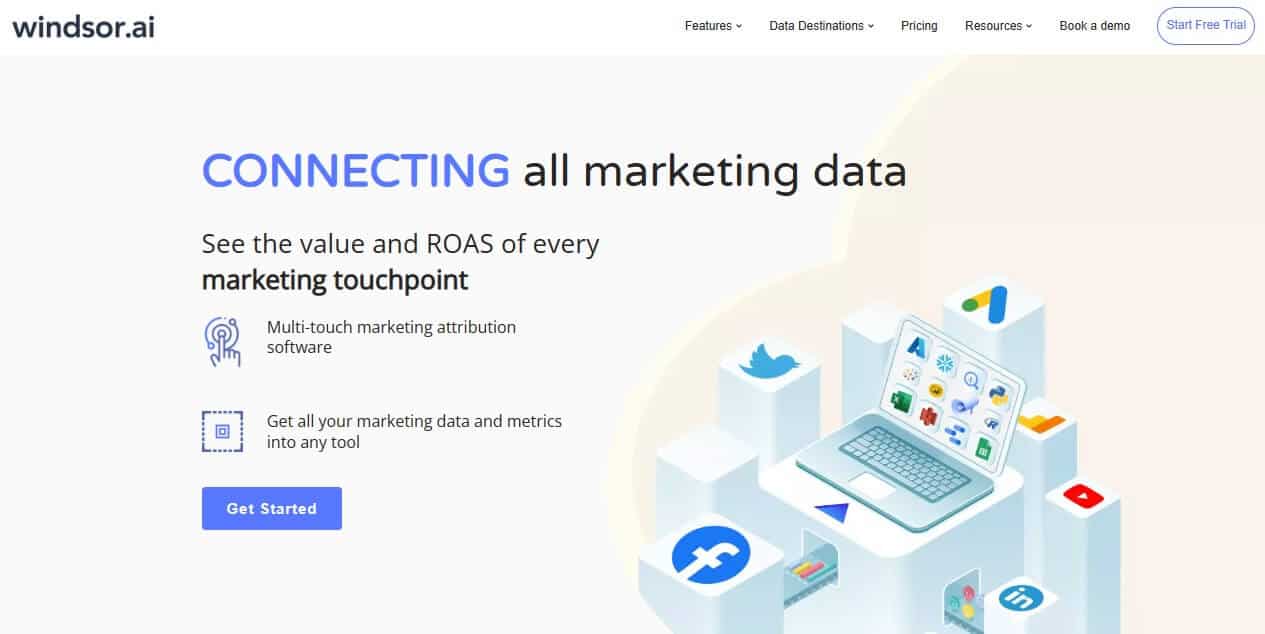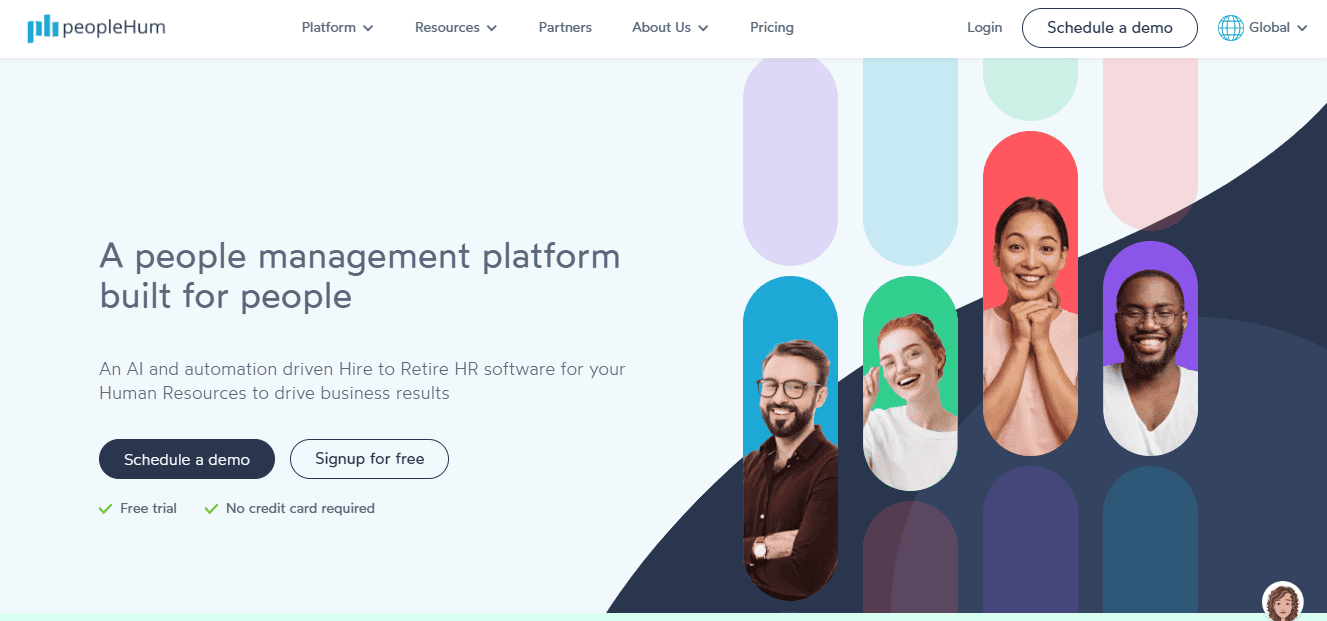15 AI Analytics Tools For Data-Driven Business Decisions in 2022
There is no doubt that artificial intelligence (AI) is quickly becoming one of the most essential tools in businesses across a variety of industries.
As AI continues to evolve and advance, so too do the analytics tools that help businesses to make better decisions.
So in this article, we’ll look at the best AI analytics tools that will help you transform your data into actionable insights.
- , Software
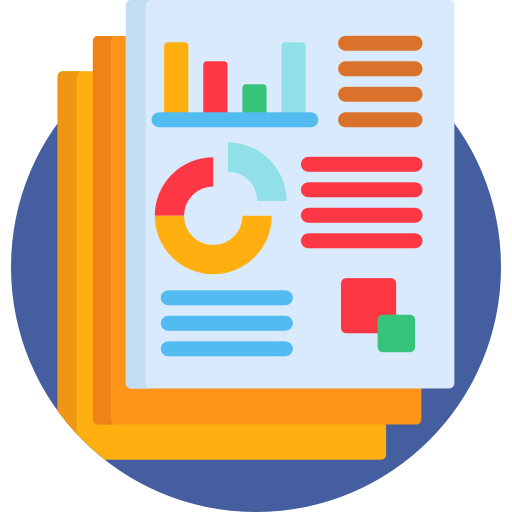
1. Databox
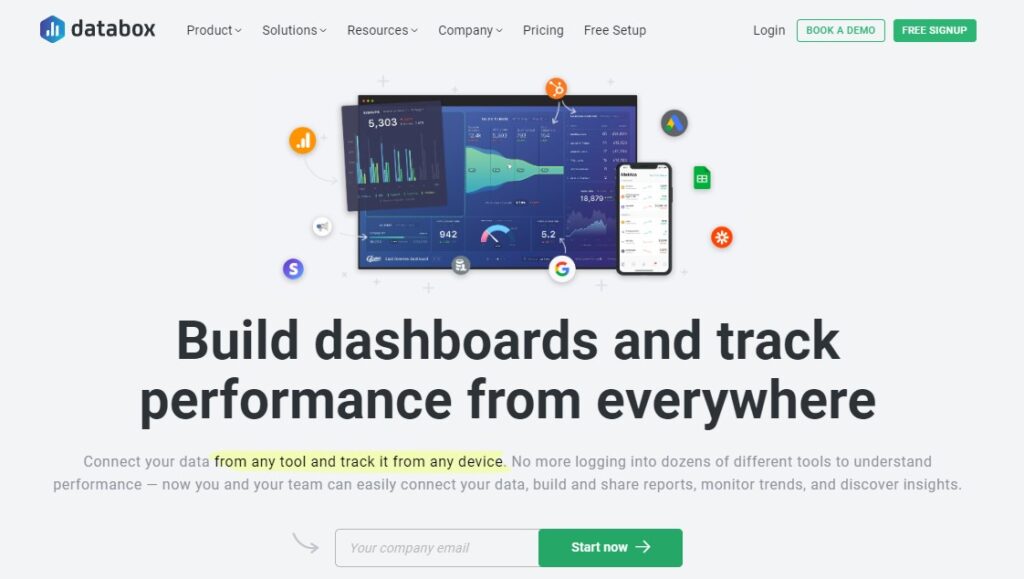
Databox is one of the best AI tools for business analytics that lets you connect all of your data in one place, develop and share reports, keep an eye on trends, and find new insights.
It combines AI and enhanced analytics to provide insightful performance management capabilities. You can connect various data sources, such as cloud data, spreadsheets, databases, and custom integrations, to centralize all of your key performance indicators (KPIs) in one comprehensive dashboard.
Databox has evolved over the years into a sophisticated analytics and reporting software with robust analytic capabilities and a wide range of integrations.
With advanced features like custom reports, tailored date ranges, spreadsheet integrations, benchmarks, detailed metrics, and more, Databox users can better sync, visualize, explore, and share their performance data.
The platform is constantly evolving, with upcoming improvements promising more advanced visualizations, multi-dimensional metrics, and expanded out-of-the-box integrations and metrics.
Regarding its AI capabilities, Databox provides a suite of AI-powered tools designed to maximize your data’s value. These include:
- Metric Forecasting, which leverages AI to predict future performance trends
- Anomaly Detection, which identifies and alerts you to significant data deviations
- Data Correlations, which reveal interconnected relationships within your data
- Generative AI Reports, which use AI to generate insightful reports
However, it’s worth mentioning that these features are available on the Growth and Premium plans.
But overall, Databox is a rapidly evolving platform committed to providing businesses with a full suite of AI-enhanced analytics tools, fostering growth through a deeper understanding of their data.
Although some users mention that setting up the tool can take some time, Databox stands out as a valuable asset for any growing business because of its ability to connect a variety of data sources and present comprehensive, easy-to-understand insights.
2. Windsor.ai
Windsor.ai is an innovative company providing AI-driven marketing data attribution software and an attribution modeling platform.
This technology focuses on enhancing the effectiveness of marketing campaigns and increasing return on investment (ROI).
Windsor lets you optimize marketing ROI across all channels. Marketers can witness a significant increase in ROI by connecting all your marketing data with Windsor.ai’s software.
This feature essentially enables you to measure the ROI for each channel, campaign, keyword, and creative, while also accounting for cancellations, returns, and even offline conversions from CRM.
The software streamlines the collection of marketing data, reducing the time spent on preparation and formatting.
The system’s connectors and APIs allow you to easily access and use your data in any tool, putting more focus on gaining insights rather than on data management.
The platform’s multi-touch attribution modeling software lets you analyze and optimize customer journeys across all touch points, saving you time when optimizing budgets. These optimizations can be directly sent back to the platforms for immediate effect.
Windsor.ai also offers attribution insights, which empower advertisers and marketers to make data-driven decisions on marketing budget allocations throughout the customer journey. By combining customer journey data with cost data, Windsor.ai can provide a Return on Ad Spend (ROAS) for all touchpoints.
The platform integrates seamlessly with a range of data destinations, including Google Sheets, Excel, Google Data Studio, Power BI, Tableau, BigQuery, Snowflake, Azure Synapse, and Amazon S3 buckets.
And when it comes to the supported connectors, Windsor includes many options as well:
- Google Ads
- Facebook Ads
- Google Analytics
- Adobe Analytics
- Facebook Page Insights
- Instagram Insights
- Linkedin Ads
- LinkedIn Page Analytics
3. Google Cloud
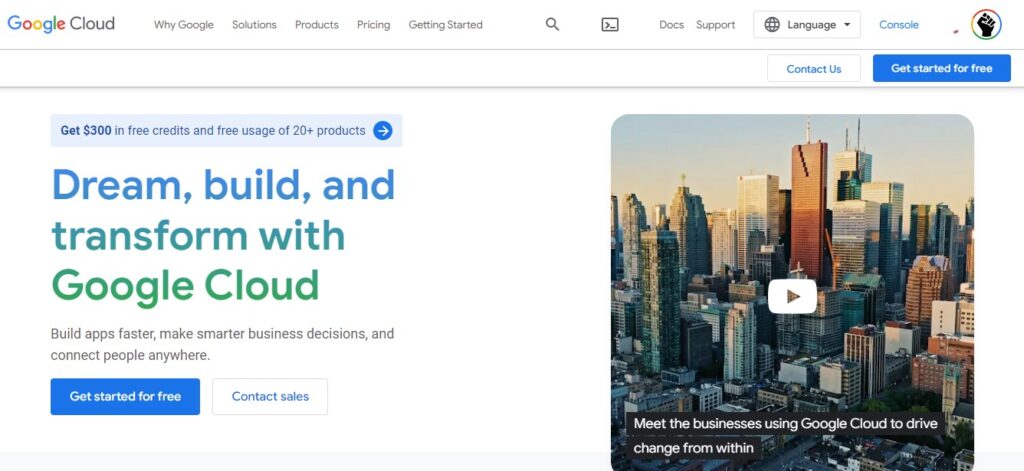
Google Cloud is a comprehensive cloud computing solution used globally by enthusiasts for small projects as well as large companies tackling complex challenges.
As a true pioneer in the artificial intelligence space, Google comes with over 150 products, including reliable cloud storage options and state-of-the-art AI tools. From hosting websites and building web and mobile applications to analyzing data, Google Cloud’s versatility supports a vast array of needs.
The Google Cloud Data Analytics suite offers multiple services for data analytics and management. Its extensive set of services include BigQuery, Cloud Dataflow, Cloud Dataproc, Cloud Datalab, and Cloud Pub/Sub.
First, we have BigQuery, an enterprise-grade data warehouse that leverages Google’s robust infrastructure for executing fast SQL queries even with enormous datasets.
BigQuery ML further enhances this by allowing the creation and deployment of machine learning models directly within BigQuery using standard SQL, making it possible for data analysts and scientists to efficiently construct models on a diverse range of structured data.
Additional tools, like the BigQuery BI Engine, offer rapid in-memory analysis for BigQuery data, enabling interactive exploration of large and complex datasets.
Connected Sheets and Data QnA provide user-friendly interfaces for data interaction, allowing users to leverage massive amounts of data within familiar tools like Google Sheets or by using natural language queries. BigQuery Omni extends this by offering fully-managed and flexible multi-cloud analytics, allowing users to analyze data across different cloud environments using SQL.
Cloud Dataflow is another key service in the Google Cloud Data Analytics suite that offers fully-managed, real-time streaming analysis. It leverages batch processing and autoscaling to optimize costs, latency, and processing time. Users can build real-time dashboards using Dataflow SQL in BigQuery’s web UI and use Autoscaling for efficient resource management.
Finally, we have Looker which is another unified business intelligence platform within Google Cloud for both self-service and governed BI. It allows users to create data-powered applications, build custom applications with trusted metrics, and even bring Looker modeling to their existing BI environment.
As you can see, Google Cloud provides a rich, user-friendly environment for data analytics and AI, catering to a wide range of business needs. Its really unique combination of data analytics, business intelligence, and AI tools makes it an exceptional choice for businesses looking to leverage data-driven insights.
4. Qlik
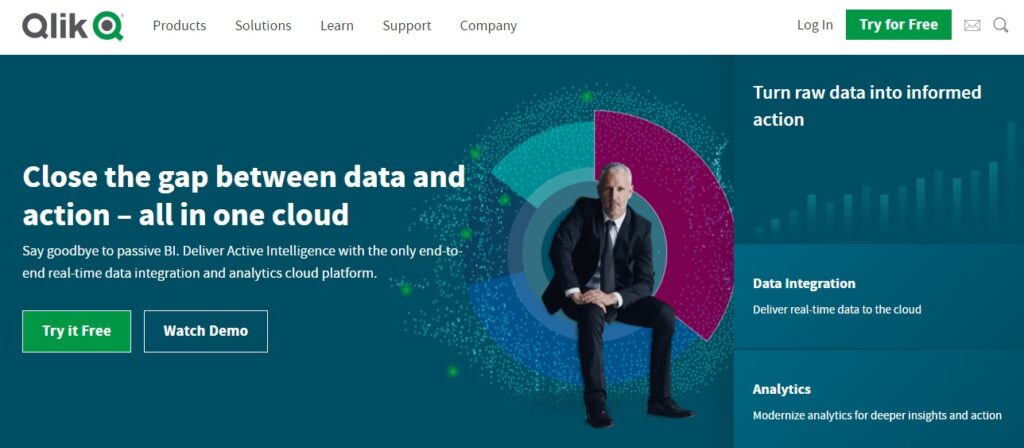
Qlik is a leading data analytics platform that utilizes cutting-edge AI and machine learning (ML) technologies to provide intelligent data analysis for all levels of business users.
Instead of the typical add-on or plug-and-play AI solutions that are common in the industry, Qlik integrates AI and ML into the core of its platform.
Coupled with Qlik’s unique Associative Engine, this integration enhances the platform’s analytics capabilities, making it possible for users of all skill levels to extract more value from their data.
For business users, Qlik offers advanced insights and natural language interaction capabilities that enhance decision-making processes.
Analysts can benefit from sophisticated analytics, automated machine learning (AutoML), and assistance with creating and preparing data.
Qlik assists in extending the impact of data science models and augmenting analytics with generative AI, enabling interactive, real-time insights for all users.
Then we have Qlik Sense which supercharges your analytics tasks with the power of AI. The software enables the automatic generation of advanced insights, assistance with analytics creation, data preparation, and simplified data exploration through natural language search, conversational analytics, and natural language generation (NLG).
A key aspect of Qlik’s platform is Qlik AutoML software, a no-code solution that brings predictive analytics and explainable AI to more everyday use cases not typically handled by data scientists.
Qlik AutoML allows users to easily generate models, make predictions, and run “what-if” scenarios without the need for coding skills. This will help you identify key drivers in your data and allows unlimited model experimentation. It also provides predictive outcomes with full explainability, enabling users to understand potential results and the reasons behind them.
5. Glew
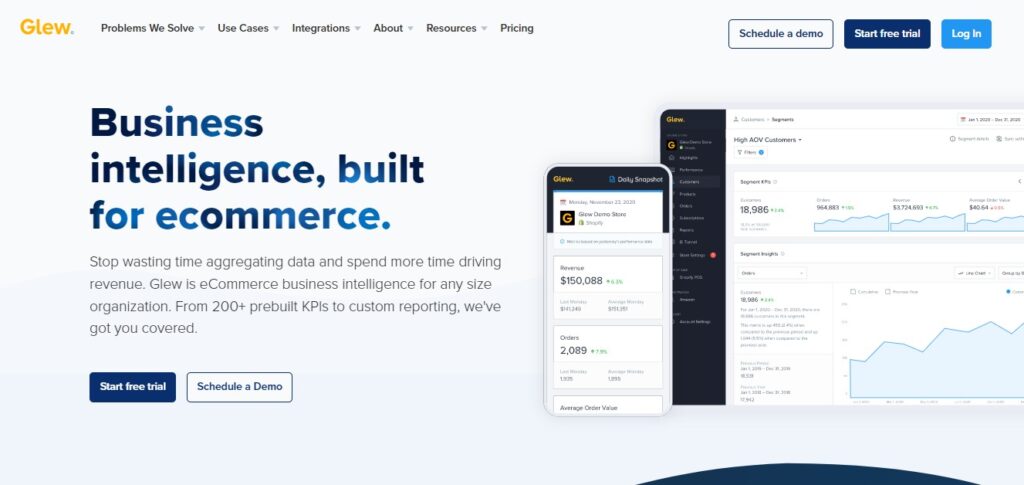
Glew is an all-encompassing ecommerce analytics tool designed for ecommerce merchants, retailers, agencies, and enterprises.
Basically, its primary goal is to help businesses leverage their data across their entire operations, providing valuable insights that can boost their profitability.
Glew integrates with a wide array of tools used in ecommerce, operations, marketing, warehouse management, and more.
Another significant feature of Glew is its provision of instant dashboards and automated recurring reports. Users also receive a daily performance snapshot directly to their inbox, keeping them up-to-date with their business operations’ key metrics.
In addition to its robust analytics and reporting features, Glew is highly regarded for its user-friendly interface, educational content, and excellent customer service.
Our research shows that Glew is particularly noted for its time-saving capabilities. The software is designed to expedite the delivery of data-driven insights and eliminate the need for manual reporting tasks.
6. Sisense
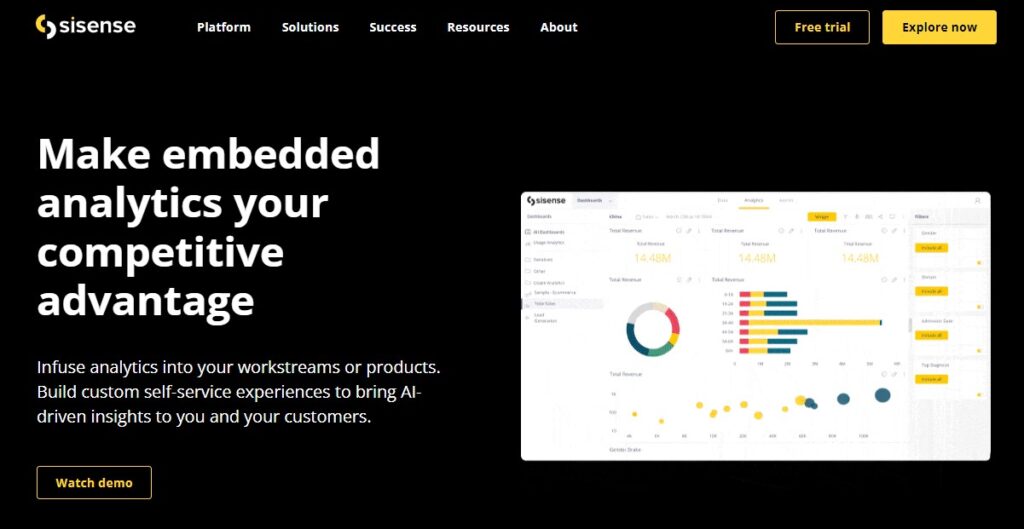
Sisense goes beyond standard business intelligence by allowing businesses to incorporate analytics in both customer and employee apps and workflows.
This highly configurable, AI-driven analytics cloud platform that infuses intelligence in the right place and at the right time, every time is breaking down the barriers to analytics adoption by going beyond the dashboard.
Sisense is trusted by plenty of worldwide enterprises to innovate, disrupt markets, and make a difference in the world. Sisense has been recognized as one of Forbes’ Cloud 100, The World’s Best Cloud Companies, five years in a row, and has been ranked as the No. 1 Business Intelligence business in terms of client success.
7. Domo
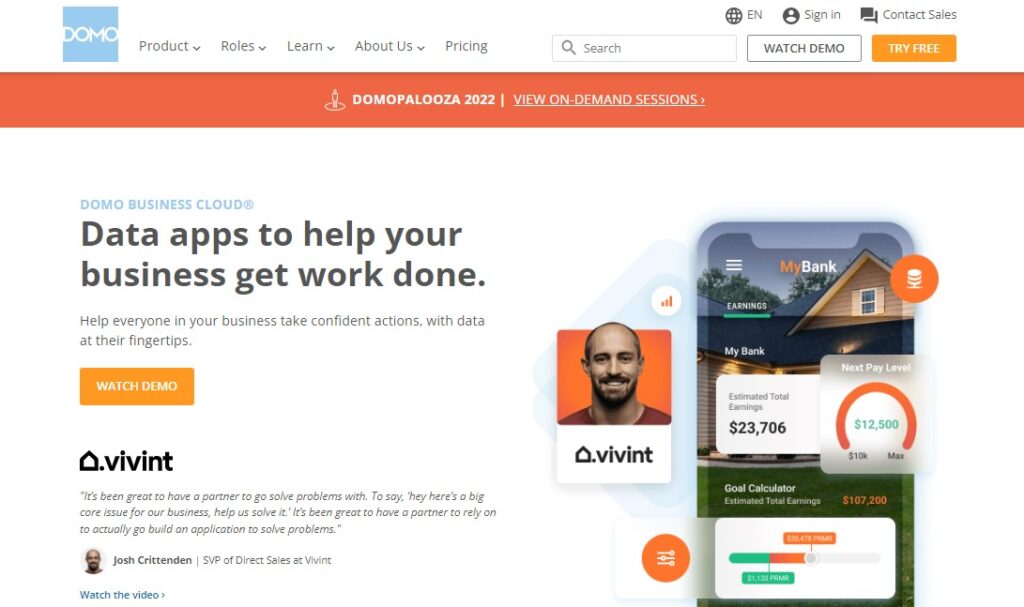
Domo revolutionizes business by making data work for everyone.
Domo’s low-code data app platform goes beyond standard business intelligence and analytics, allowing anybody to develop data apps to power any action in their company, exactly where work is done.
Thanks to Domo’s fully integrated cloud-native platform, critical business processes may now be streamlined in days rather than months or years.
It complements existing data warehouse and business intelligence (BI) technologies by allowing users to create bespoke applications, automate data pipelines, and make data science accessible to everyone through automated insights that can be shared with internal and external stakeholders.
The software features a user-friendly interface, which makes even complicated procedures and widgets accessible to non-techies. Analysts can add unique data, such as business-specific trend indicators, multi-part widgets, and sparklines, to their reports.
8. KNIME
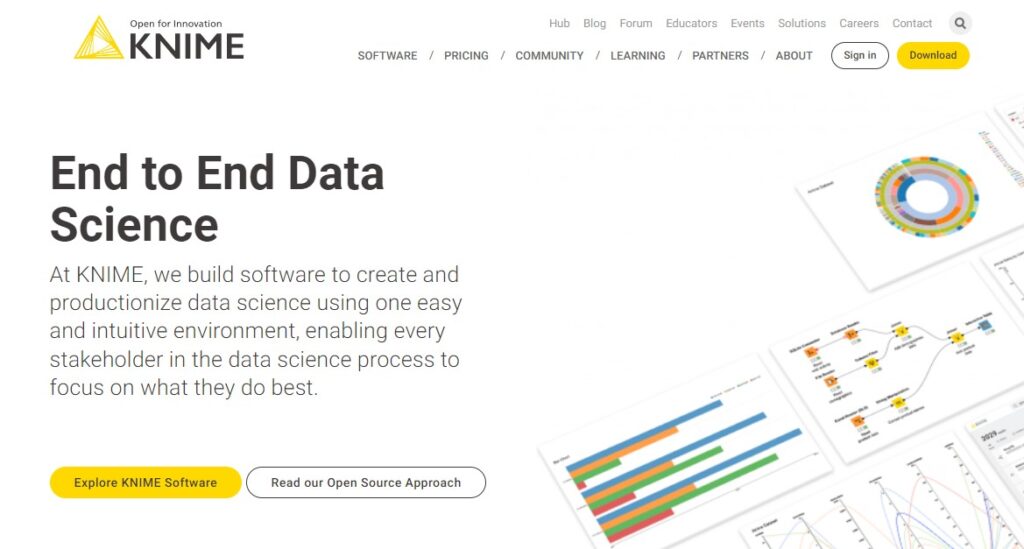
KNIME is an open-source analytics tool for developing data science that uses a GUI-based approach to eliminate the requirement for coding knowledge.
The system features a built-in modular workflow approach that documents and maintains the analytic process in the same order that it was developed and conducted, guaranteeing that interim results are always available.
KNIME is compatible with Windows, Linux, and Mac operating systems and is appropriate for businesses of all sizes. You can do everything from fundamental I/O through data manipulations, transformations, and data mining.
It streamlines the entire procedure by combining all of the functions into a single workflow. The solution is based on visual programming and covers all major data wrangling and machine learning approaches.
9. Minitab
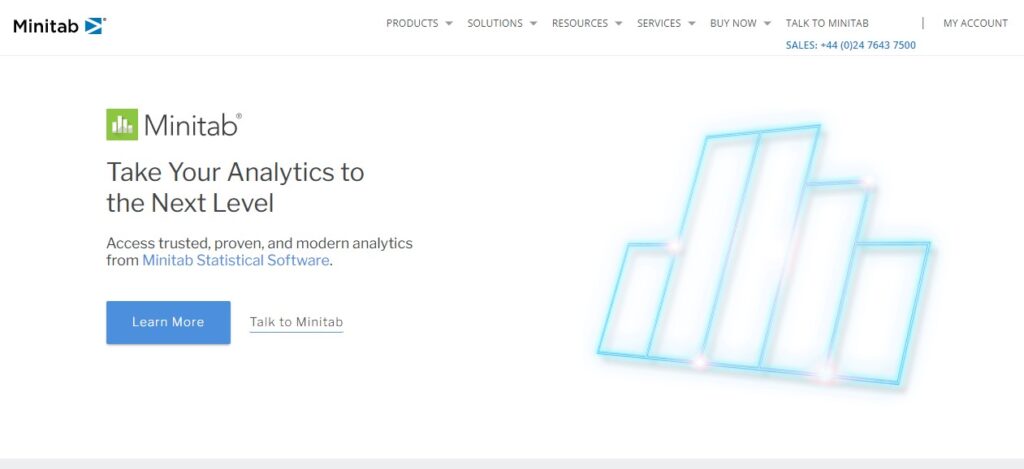
Minitab is a cloud-based statistical tool that can be used by small to big businesses in a variety of industries to find market trends, anticipate patterns, and display data.
Among its key features are statistical modeling, data sharing, time series, simulations, and distributions. Professionals can enhance product design processes by using t-tests, one and two proportions hypotheses, normality testing, chi-square, and equivalence tests.
Minitab’s classification and regression trees (CART), logistic regression, factor analysis, and cluster variables allow data scientists to estimate business outcomes.
Engineers can get insight using scatterplots, bubble plots, box plots, and histograms, among other graphical outputs. It has a built-in assistant that walks users through the full analysis process and explains the data using summary, diagnostic, and report cards.
10. Impira
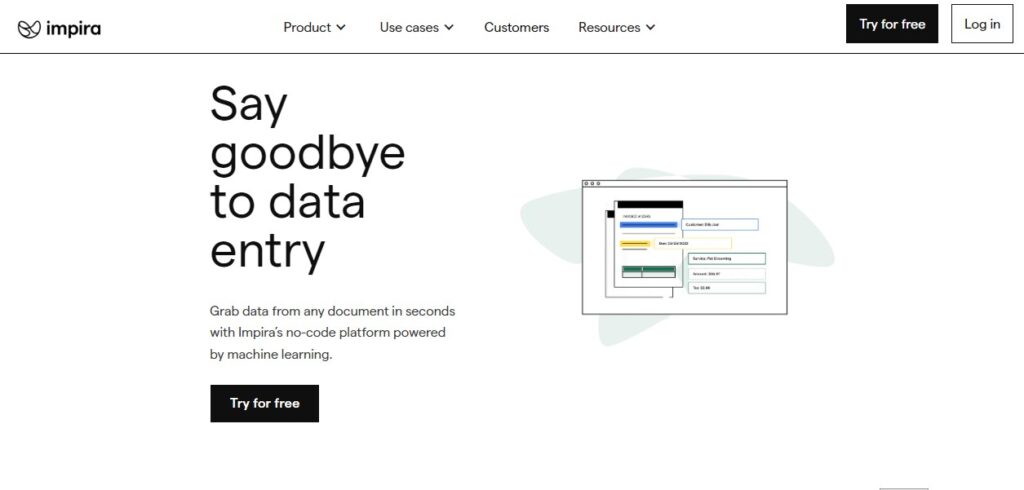
Using machine learning technology, Impira retrieves data from documents such as purchase orders, claims forms, and invoices. Without writing a single line of code, any business user can develop sophisticated automation with our no-code platform.
In just a few clicks, you can extract totals, invoice numbers, payment conditions, and more from many invoices. Then, you can export them into a spreadsheet. And you can Label photographs automatically to make searching by places, colors, and other features a breeze. To keep track of extra metadata, attach use contracts and invoices to photos.
Whether they are PDFs, scans, or pictures, automatically extract information like party names, effective dates, and renewal conditions from contracts. Impira will identify matches in your other files, regardless of document format, when you highlight the text you wish to extract. To train Impira’s platform and improve accuracy, review and confirm Impira’s auto-generated matches.
11. PeopleHum
PeopleHum is an AI HR software that offers a suite of powerful tools designed to uncover hidden workforce trends and enable data-driven decision-making.
One of its key features is the Hiring Funnel, which provides real-time snapshots of recruitment processes. This tool tracks metrics such as time-to-fill and drop rates, as well as recruiter efficiency, helping HR teams move swiftly from insight to action.
With the Pulse Survey feature, businesses can keep their finger on the pulse of workplace sentiment. This tool essentially enables timely pulse checks that are tailored to the organization’s priorities and goals, fostering a more engaged and responsive workforce.
The Employee Engagement Index is another standout feature. Using heat maps, this tool speeds up the process of gaining insights into factors affecting engagement, productivity, turnover, and performance.
PeopleHum also includes a custom report Builder, an integrated tool allowing users to generate detailed HR reports instantly. This feature turns data into easy-to-understand charts and graphs, making complex data analysis a breeze.
The Performance Dashboard feature offers a clear visual representation of employee performance across the organization which basically identifies high and low performers and allows for a comprehensive evaluation of talent.
Last but not least, the Trend & Insights tool lets you monitor engagement factors across your organization. It correlates engagement, retention, and performance insights, aiding you in fine-tuning your employee engagement strategy.
In essence, PeopleHum stands out as the best AI HR analytics software, providing comprehensive, insightful, and user-friendly features that empower HR teams to optimize their processes and workforce management.
12. Dynamic AI
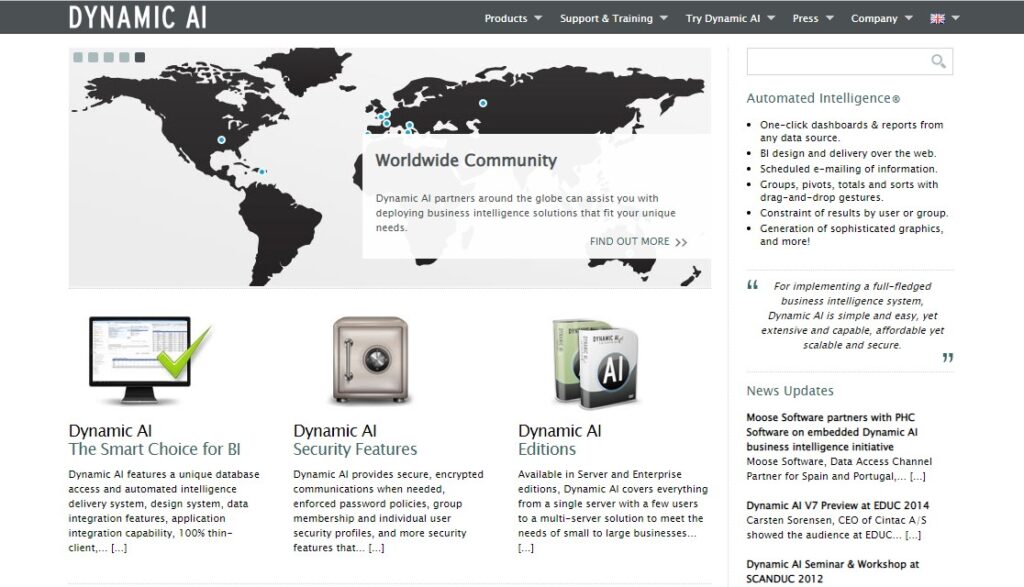
Dynamic AI’s unique blend of technologies is relied on by VARs and IT developers all around the world. It automates the transmission of information, saves time, and gives users safe, quick, and simple access to their data. Dynamic AI has a database access system, an automated intelligence delivery system, design systems, data integration features, and application integration capabilities that are all unique. It is completely thin-client.
Secure encrypted communications, enforced password regulations and group membership, individual user security profiles, and other security features are all available with Dynamic AI. Server and Enterprise versions of Dynamic AI are available.
It can be installed on any server with a few users, or it can be used as a part of a multi-server system to satisfy the demands of both small and large enterprises. Web App end-to-end solutions are provided by Dynamic AI. Performance Metrics, Strategic Planning, and Data Analysis are all available in one spot with this.
13. Polymer
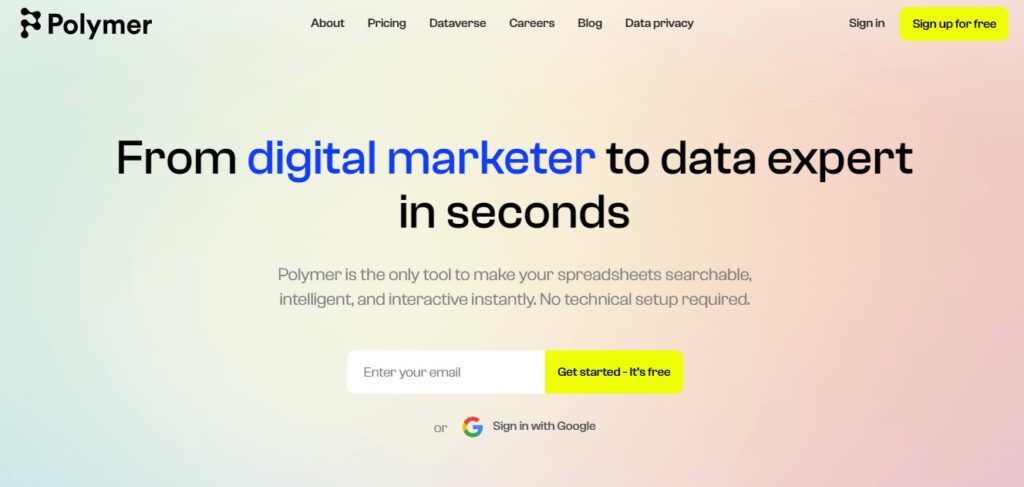
One of the best ways to make your spreadsheets searchable and intelligent is to use Polymer. There is no need for any technological setup. Polymer maps and finds relationships in your data using the most up-to-date AI data methods.
You can discover new information, create charts and graphs, and create reports in seconds. You can leverage data from Google, Facebook, and other advertising platforms to find the most effective creatives, optimize ad costs, and amaze your stakeholders. You may engage with your data in a more straightforward, visual manner right away. You can go from signing up to a fully constructed web interface that stores your data in less than a minute. Anyone can grasp Polymer’s interactive and automated approach to data analysis and pivot tables in minutes.
14. SAP BusinessObjects
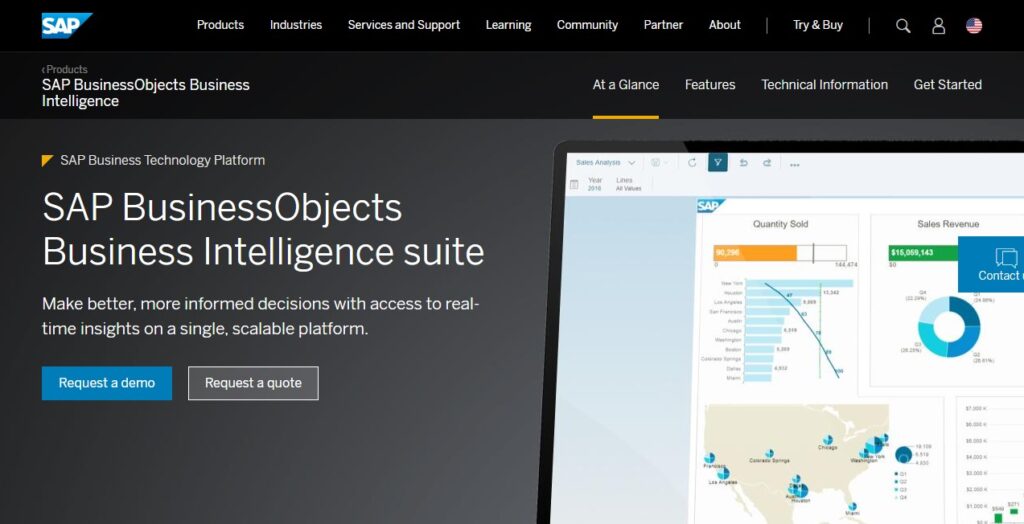
The SAP BusinessObjects is a scalable and adaptable data infrastructure that makes it easier to uncover and share insights for smarter business decisions. Scalability from one to many tools and interfaces on-premise, in the cloud, or as a hybrid approach is enabled by the integrated, unified architecture.
This is a platform that connects people, information, and enterprises across business networks to help you improve company performance. SAP BusinessObjects Business Intelligence is a collection of reporting and analysis apps, each with its own identity, purpose, and functionality. The exploration tool allows users to explore through enormous amounts of data and create unique representations of their results.
15. MonkeyLearn
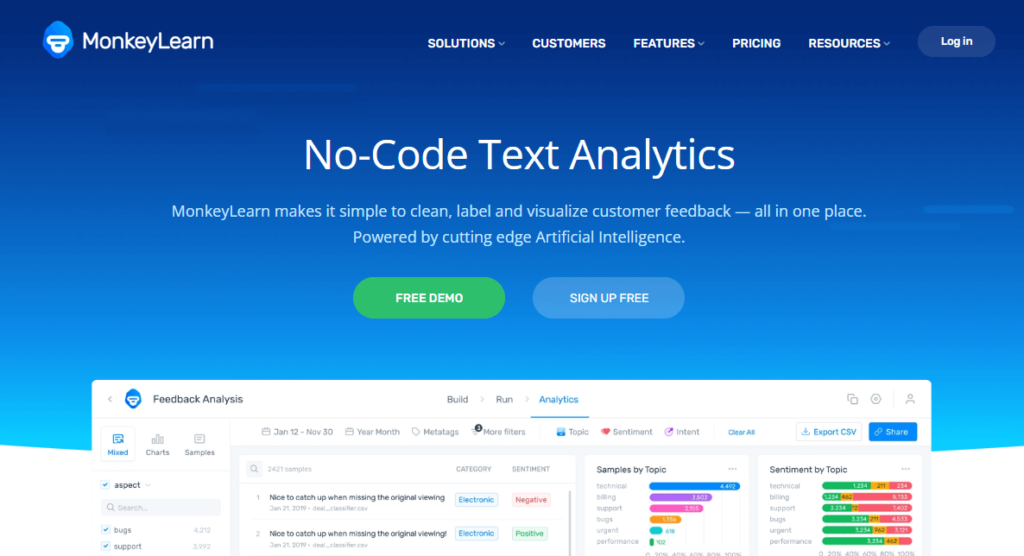
MonkeyLearn is a cloud-based text analytics tool that assists small and big businesses in developing machine learning (ML) models for sentiment analysis, subject categorization, intent detection, and entity extraction.
Support teams can use the program to automatically categorize, route, and prioritize request tickets. Customers’ input and opinions from reviews, chats, polls, comments, and support issues may be analyzed and used to improve the product roadmap.
MonkeyLearn assists programmers in creating text extractors that obtain specified keywords, characteristics, or entities from a text. It also includes historical tracking, tag prediction, classification, data input, process automation, and visualization, among other capabilities.
It integrates with a number of third-party programs, including Zendesk, HelpScout, Google Forms, Airtable, Gmail, and others. Monthly memberships are available, and assistance is provided via email, chat, and phone.
AI Data Analytics Tools Final Words
With the use of AI analytics tools, it is possible for businesses to gain some competitive advantage over their competitors and to excel in their markets. Needless to say, analytics play a very important role in today’s businesses.
All sorts of companies from large ones to small ones usually spend a lot on analytics. But now that you know about AI data analytics tools, you can make use of them for your business. They not only save time for you but make things efficient for you as well. So, now it is time you made use of them.
Patryk Miszczak


